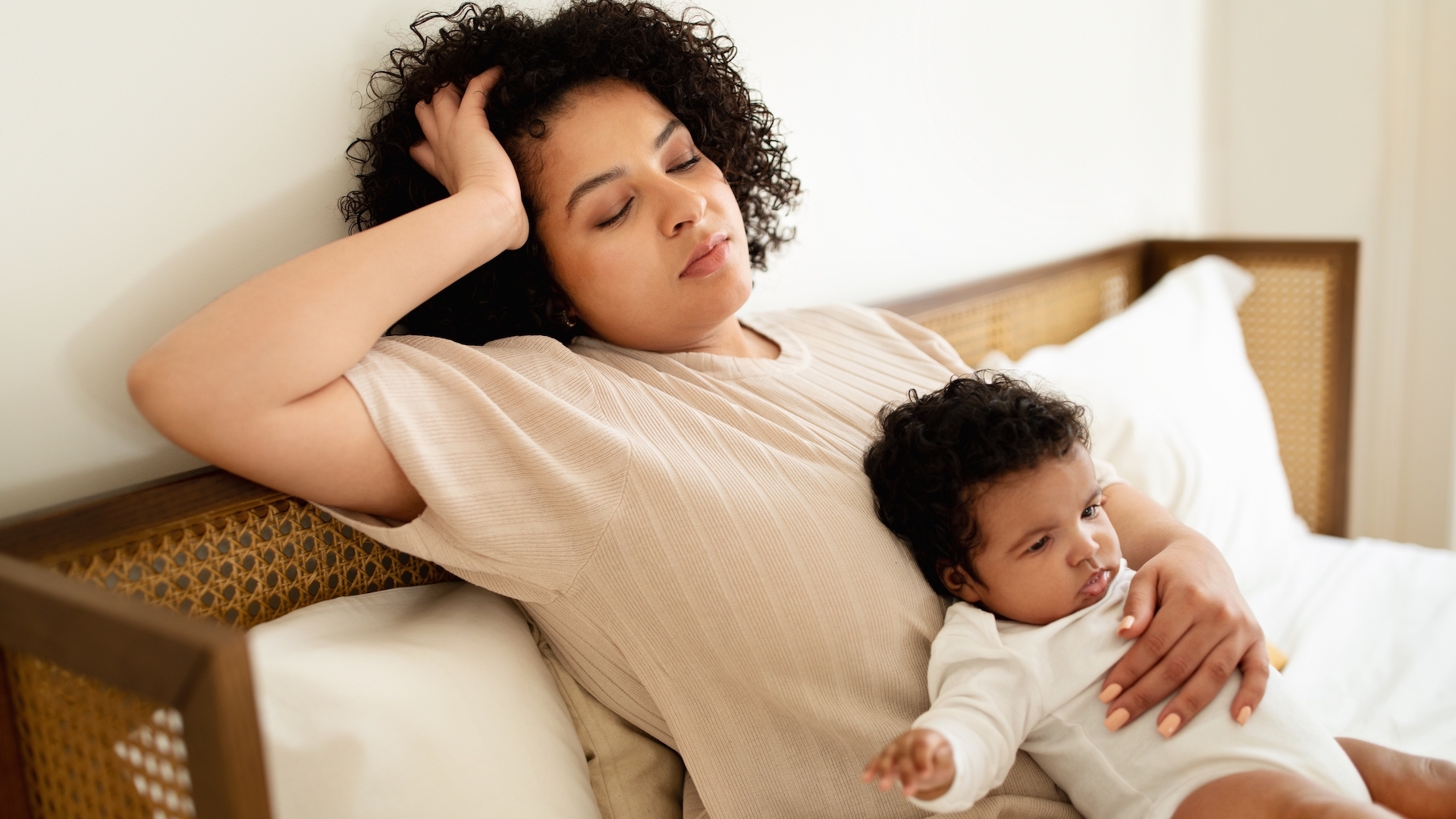Feeling the squeeze of motherhood anxiety lately? Hi, same. And tbh, you’re far from alone. As the leaves change and we settle into the school routine, it’s natural to feel a whirlwind of emotions. But don’t worry — this season, we’re bringing you expert advice on managing anxiety.
From intrusive thoughts to PPA/PPD, here’s how to handle the mental challenges of parenting — whether you’re dealing with school transitions, enduring long newborn nights, or trying to conceive (TTC). Let’s unpack these challenges together and find ways to enjoy (or at least survive) the journey of motherhood, one deep breath and casual freakout at a time.
How To Handle Motherhood Stress and Anxiety

Whether you’re tackling tantrums, bedtime battles, or just the overwhelming feelings that come with taking care of little humans, licensed marriage & family therapist Ashley Prechtl is here to answer your most pressing questions about parental anxiety.
Let’s talk intrusive thoughts — why do these happen and what can parents do about it?
It’s completely normal for moms to experience a certain level of worry about their child’s safety and well-being. As parents, the responsibility of caring for and raising our children can naturally lead to anxiety about potential dangers, or even the fear of our own mortality and its impact on our children.
Take note of how frequently these worries arise — whether they occupy minutes, hours, or days of your week — and assess if they are affecting your behaviors, decisions, or interactions with your children. If you need real-time relief, try one of these coping tips:
- Grounding Exercise: What are 5 things you can see, 4 things you can feel, 3 things you can hear, 2 things you can smell, 1 thing you can taste?
- Deep Breathing: Inhale through your nose for 4 seconds, hold the air in your lungs for 6 seconds, exhale through your mouth for 4 seconds. Repeat the exercise a few times.
- Progressive Muscle Relaxation: Tense and then slowly release your muscles starting from your toes working all the way up to your head.
- Hum a song to yourself: It calms your nervous system.
If you find that your anxiety is significantly impacting your life or well-being, it’s time to seek support from a therapist.
Is anxiety/sadness about having more children after you already have one normal?
Yes! First things first: Acknowledge that your concerns are valid — parenting is a huge responsibility, and it’s okay to have mixed feelings. Then, consider the strengths you’ve gained from raising your first child, and how those experiences can help you manage the demands of another. Finally, to ease your anxiety, plan for how you can structure your time to ensure each child feels valued and loved.
How can moms tell if they have PPA/PPD or if it’s just, like, motherhood?
Common signs include feeling unusually down or anxious, having trouble connecting with your baby, changes in appetite or sleep, withdrawing from loved ones, or experiencing overwhelming feelings of worthlessness or panic. If any of these feelings sound familiar or if you’re concerned you might have PPA/PPD, it’s important to talk to your doctor. Early screening can make a big difference.
PPA/PPD affects everyone differently, and how long it lasts/how late in manifests is influenced by factors like personal history, the severity of symptoms, how quickly you seek help, and the strength of your support network.
How to deal with leaving your child with someone else (daycare, other parent, grandparent, sitter, etc)?
Feeling anxious about leaving your child with someone else is completely natural. Start by entrusting them to someone both you and your child feel comfortable with. While it’s normal to worry, taking practical steps can help ease your mind. Write down your child’s daily routine, and pack their favorite snack and toy. Remember, it’s okay to rely on others for support — people want to help you.
What to do about anxiety after pregnancy loss, especially as you’re TTC or pregnant again?
Anxiety after pregnancy loss is entirely normal. Allow yourself to fully experience your emotions without judgment and share your feelings with your partner. Consider limiting exposure to triggers, such as avoiding pregnancy forums or muting social media accounts as needed. Establish a consistent self-care routine, focusing on gentle exercise, adequate sleep, and nutritious eating to manage anxiety. Celebrate small milestones during your pregnancy to focus on positive progress and consider seeking support from a therapist to navigate this challenging experience.
How TF do we handle the fact that becoming a mom feels like losing your old self?
Feeling like you’re losing your ‘old self’ after becoming a mom is a common yet unsettling experience. Reflect on your pre-baby personality, interests, and values, and explore ways to integrate these into your new role as a mother. Rather than seeing this as a loss, view it as an opportunity to expand your identity. Embrace the changes, and allow yourself to discover and enjoy the new dimensions of who you are. Remember, stepping into motherhood doesn’t mean abandoning your former self—it means evolving.




















































